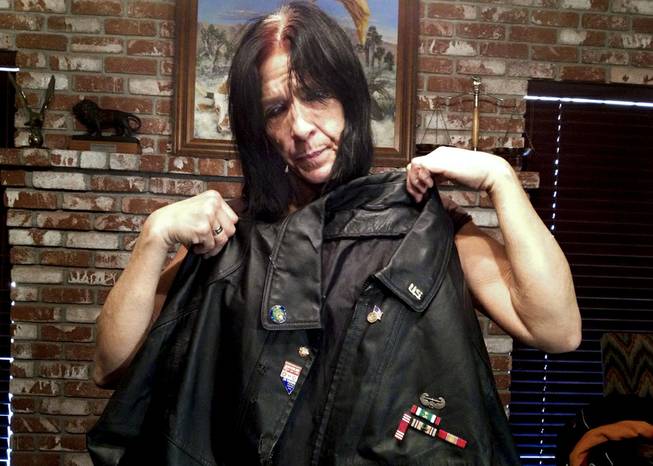
Rondha Gibson, wife of Stanley Gibson, the Gulf War veteran fatally shot by Metro Police in December 2011, holds her husband’s leather jacket bearing his military medals in her attorney’s office on Monday, Oct. 28, 2013.
Tuesday, Oct. 29, 2013 | 2 a.m.
Sun coverage
- Officer who killed Gulf War vet Stanley Gibson to face termination hearing
- Answers emerge as to why cop shot, killed unarmed veteran
- Source: Metro blames police radio for officer firing on unarmed veteran
- Grand jury refuses to indict cop who killed unarmed veteran
- Family of slain veteran still wants to see someone held accountable
- Police had contacts with troubled veteran before deadly shooting
- The tragedy of Stanley Gibson’s death began days before he was shot by police
- Sheriff seeks OK for $1.5 million settlement with widow of slain Gulf War veteran
- DA: No charges against Metro cop who shot veteran dead
The black leather jacket sports bullet holes and military medals.
It’s the garment 43-year-old Stanley Gibson, a Gulf War veteran, was wearing in December 2011 when a Metro Police officer fatally shot him.
His wife, Rondha Gibson, reclaimed the jacket last week when it was released from an evidence vault — a tangible reminder of both her husband’s life and the end of her legal battle with the police department.
“It means the world to me,” she said, while clutching the jacket Monday inside her attorney’s office. “It shows me that he wasn’t a coward. He was our hero.”
On Monday, Rondha Gibson received something more from Metro: a $1.5 million settlement in response to her federal lawsuit accusing Las Vegas police of civil rights violations leading to the wrongful death of her husband.
Metro’s Fiscal Affairs Committee approved the payment during a meeting Monday following more than a year of negotiations between the department and Rondha Gibson’s lawyers, Cal Potter and John Funk.
Attorney Craig Anderson, who serves as outside counsel for Metro, told committee members that the settlement — although a large sum of money — was actually an “excellent economic decision” by the department.
“We come to a figure that we think is fair that saves the department money while, at the same point, fairly compensates the plaintiff but does not give one of the higher verdicts that they may seek from a jury,” he said, explaining the rationale for settling the case versus going to a trial. “There’s certainly a cost-benefit analysis.”
For Rondha Gibson, it serves as a necessary life raft, relieving her of numerous financial burdens since her husband’s death, which resulted in the loss of her home and outstanding funeral expenses.
“It has been a long process; it has been a long time,” she said. “The money — it’s OK, but to me, being with Stan was worth a million dollars every day.”
The deadly officer-involved shooting happened in the early-morning hours of Dec. 12, 2011, at the Alondra Condominiums, 2451 N. Rainbow Blvd., after reports of an attempted burglary.
When the suspect vehicle described to police — a white Cadillac — reappeared at the complex, officers blocked it in and realized it belonged to Stanley Gibson. Police said Stanley Gibson refused commands to get out of his vehicle and rammed a patrol car, periodically revving his car’s engine and spinning its tires.
A bungled police plan to force Stanley Gibson out of his vehicle led to the shooting. Officer Jesus Arevalo mistakenly thought he was being shot at and returned fire.
He fired seven shots from his .223-caliber rifle into the Cadillac, killing Stanley Gibson, who his wife said suffered from post-traumatic stress disorder. Stanley Gibson was unarmed.
A year later, Rondha Gibson filed in federal court her civil rights lawsuit against Metro, Sheriff Doug Gillespie, Arevalo, Lt. David Dockendorf, Sgt. Michael Hnatuick and Officer Malik Grego-Smith.
Stanley Gibson’s mother, Celestine Gibson, filed a separate federal lawsuit last year, but the department has not reached a settlement in that case. Anderson said Celestine Gibson rejected one offer.
Attorney Andre Lagomarsino, who is representing Gibson’s mother, said this month that he expects the case to head to a jury trial in late 2014 or early 2015.
Potter, an attorney known for successfully suing Metro, said Rondha Gibson opted to settle with the department to avoid a jury trial — a path that could have yielded a higher payment. But that process would have been fraught with appeals, thus prolonging a payout for multiple years, he said.
The $1.5 million settlement gives his client “the ability to be taken care of the rest of her life,” Potter said.
Rondha Gibson said she plans to stay in Las Vegas and eventually form a foundation to help widows, an idea born of her frustrations obtaining community resources after her husband died.
“I don’t want no one to ever, ever endure the hell that I went through because it’s not fair and it’s not right,” she said.
The settlement comes on the heels of the sheriff’s decision to terminate Arevalo’s employment with Metro two weeks ago. Arevalo has a 30-day window to appeal the decision, though.
The payout is the latest in a string of hefty settlements Metro has awarded in recent years. The Fiscal Affairs Committee approved a $1.7 million settlement less than two years ago to the family of Trevon Cole, an unarmed 21-year-old shot by police in June 2010 in his apartment bathroom.



Join the Discussion:
Check this out for a full explanation of our conversion to the LiveFyre commenting system and instructions on how to sign up for an account.
Full comments policy